BUS3003 Corporate Responsibility: Ethics, Governance & Volkswagen Case
VerifiedAdded on 2023/06/07
|9
|2850
|360
Report
AI Summary
This report analyzes Volkswagen's corporate responsibility, ethics, and governance, highlighting the need for sustainability within the organization. It discusses the history of Volkswagen, its corporate responsibility theory based on Caroll's model (economic, legal, ethical, and discretionary responsibilities), and the importance of transparency, accountability, and ethical management. The report emphasizes the role of ethical decision-making, stakeholder management, and crisis management in ensuring the long-term success and reputation of the Volkswagen Group. The analysis includes the company's efforts to integrate environmental, social, and economic objectives, address emission challenges, and implement ethical guidelines for its employees and management.
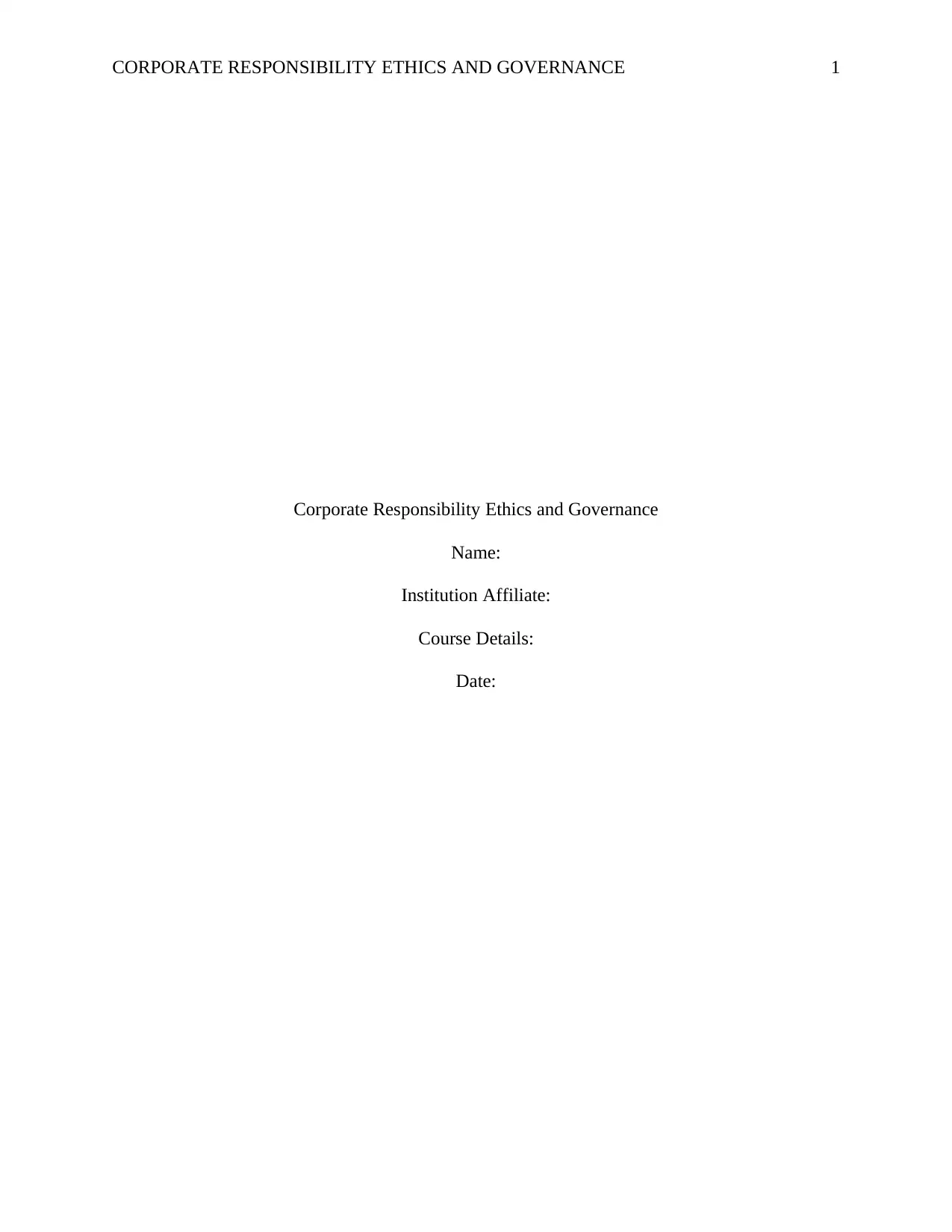
CORPORATE RESPONSIBILITY ETHICS AND GOVERNANCE 1
Corporate Responsibility Ethics and Governance
Name:
Institution Affiliate:
Course Details:
Date:
Corporate Responsibility Ethics and Governance
Name:
Institution Affiliate:
Course Details:
Date:
Paraphrase This Document
Need a fresh take? Get an instant paraphrase of this document with our AI Paraphraser
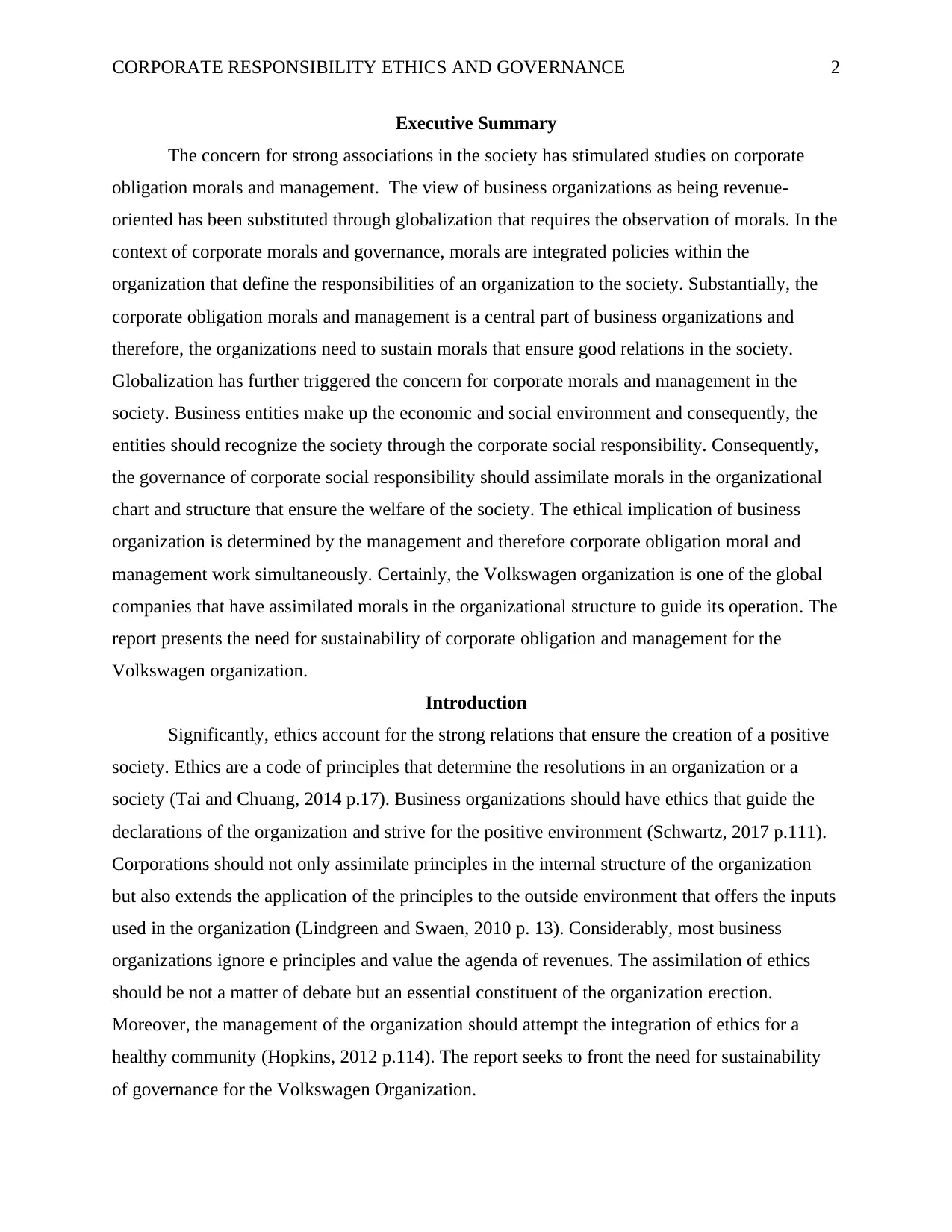
CORPORATE RESPONSIBILITY ETHICS AND GOVERNANCE 2
Executive Summary
The concern for strong associations in the society has stimulated studies on corporate
obligation morals and management. The view of business organizations as being revenue-
oriented has been substituted through globalization that requires the observation of morals. In the
context of corporate morals and governance, morals are integrated policies within the
organization that define the responsibilities of an organization to the society. Substantially, the
corporate obligation morals and management is a central part of business organizations and
therefore, the organizations need to sustain morals that ensure good relations in the society.
Globalization has further triggered the concern for corporate morals and management in the
society. Business entities make up the economic and social environment and consequently, the
entities should recognize the society through the corporate social responsibility. Consequently,
the governance of corporate social responsibility should assimilate morals in the organizational
chart and structure that ensure the welfare of the society. The ethical implication of business
organization is determined by the management and therefore corporate obligation moral and
management work simultaneously. Certainly, the Volkswagen organization is one of the global
companies that have assimilated morals in the organizational structure to guide its operation. The
report presents the need for sustainability of corporate obligation and management for the
Volkswagen organization.
Introduction
Significantly, ethics account for the strong relations that ensure the creation of a positive
society. Ethics are a code of principles that determine the resolutions in an organization or a
society (Tai and Chuang, 2014 p.17). Business organizations should have ethics that guide the
declarations of the organization and strive for the positive environment (Schwartz, 2017 p.111).
Corporations should not only assimilate principles in the internal structure of the organization
but also extends the application of the principles to the outside environment that offers the inputs
used in the organization (Lindgreen and Swaen, 2010 p. 13). Considerably, most business
organizations ignore e principles and value the agenda of revenues. The assimilation of ethics
should be not a matter of debate but an essential constituent of the organization erection.
Moreover, the management of the organization should attempt the integration of ethics for a
healthy community (Hopkins, 2012 p.114). The report seeks to front the need for sustainability
of governance for the Volkswagen Organization.
Executive Summary
The concern for strong associations in the society has stimulated studies on corporate
obligation morals and management. The view of business organizations as being revenue-
oriented has been substituted through globalization that requires the observation of morals. In the
context of corporate morals and governance, morals are integrated policies within the
organization that define the responsibilities of an organization to the society. Substantially, the
corporate obligation morals and management is a central part of business organizations and
therefore, the organizations need to sustain morals that ensure good relations in the society.
Globalization has further triggered the concern for corporate morals and management in the
society. Business entities make up the economic and social environment and consequently, the
entities should recognize the society through the corporate social responsibility. Consequently,
the governance of corporate social responsibility should assimilate morals in the organizational
chart and structure that ensure the welfare of the society. The ethical implication of business
organization is determined by the management and therefore corporate obligation moral and
management work simultaneously. Certainly, the Volkswagen organization is one of the global
companies that have assimilated morals in the organizational structure to guide its operation. The
report presents the need for sustainability of corporate obligation and management for the
Volkswagen organization.
Introduction
Significantly, ethics account for the strong relations that ensure the creation of a positive
society. Ethics are a code of principles that determine the resolutions in an organization or a
society (Tai and Chuang, 2014 p.17). Business organizations should have ethics that guide the
declarations of the organization and strive for the positive environment (Schwartz, 2017 p.111).
Corporations should not only assimilate principles in the internal structure of the organization
but also extends the application of the principles to the outside environment that offers the inputs
used in the organization (Lindgreen and Swaen, 2010 p. 13). Considerably, most business
organizations ignore e principles and value the agenda of revenues. The assimilation of ethics
should be not a matter of debate but an essential constituent of the organization erection.
Moreover, the management of the organization should attempt the integration of ethics for a
healthy community (Hopkins, 2012 p.114). The report seeks to front the need for sustainability
of governance for the Volkswagen Organization.
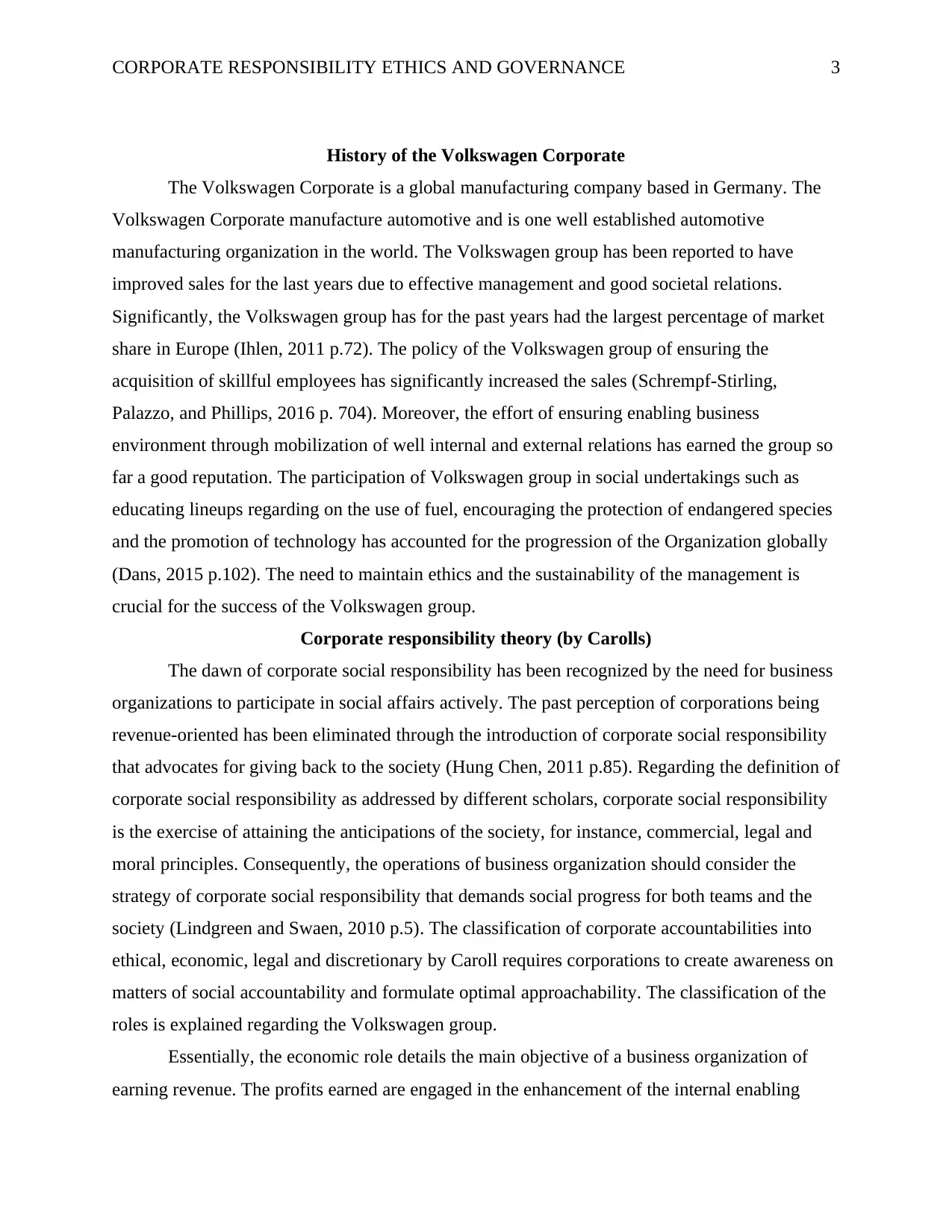
CORPORATE RESPONSIBILITY ETHICS AND GOVERNANCE 3
History of the Volkswagen Corporate
The Volkswagen Corporate is a global manufacturing company based in Germany. The
Volkswagen Corporate manufacture automotive and is one well established automotive
manufacturing organization in the world. The Volkswagen group has been reported to have
improved sales for the last years due to effective management and good societal relations.
Significantly, the Volkswagen group has for the past years had the largest percentage of market
share in Europe (Ihlen, 2011 p.72). The policy of the Volkswagen group of ensuring the
acquisition of skillful employees has significantly increased the sales (Schrempf-Stirling,
Palazzo, and Phillips, 2016 p. 704). Moreover, the effort of ensuring enabling business
environment through mobilization of well internal and external relations has earned the group so
far a good reputation. The participation of Volkswagen group in social undertakings such as
educating lineups regarding on the use of fuel, encouraging the protection of endangered species
and the promotion of technology has accounted for the progression of the Organization globally
(Dans, 2015 p.102). The need to maintain ethics and the sustainability of the management is
crucial for the success of the Volkswagen group.
Corporate responsibility theory (by Carolls)
The dawn of corporate social responsibility has been recognized by the need for business
organizations to participate in social affairs actively. The past perception of corporations being
revenue-oriented has been eliminated through the introduction of corporate social responsibility
that advocates for giving back to the society (Hung Chen, 2011 p.85). Regarding the definition of
corporate social responsibility as addressed by different scholars, corporate social responsibility
is the exercise of attaining the anticipations of the society, for instance, commercial, legal and
moral principles. Consequently, the operations of business organization should consider the
strategy of corporate social responsibility that demands social progress for both teams and the
society (Lindgreen and Swaen, 2010 p.5). The classification of corporate accountabilities into
ethical, economic, legal and discretionary by Caroll requires corporations to create awareness on
matters of social accountability and formulate optimal approachability. The classification of the
roles is explained regarding the Volkswagen group.
Essentially, the economic role details the main objective of a business organization of
earning revenue. The profits earned are engaged in the enhancement of the internal enabling
History of the Volkswagen Corporate
The Volkswagen Corporate is a global manufacturing company based in Germany. The
Volkswagen Corporate manufacture automotive and is one well established automotive
manufacturing organization in the world. The Volkswagen group has been reported to have
improved sales for the last years due to effective management and good societal relations.
Significantly, the Volkswagen group has for the past years had the largest percentage of market
share in Europe (Ihlen, 2011 p.72). The policy of the Volkswagen group of ensuring the
acquisition of skillful employees has significantly increased the sales (Schrempf-Stirling,
Palazzo, and Phillips, 2016 p. 704). Moreover, the effort of ensuring enabling business
environment through mobilization of well internal and external relations has earned the group so
far a good reputation. The participation of Volkswagen group in social undertakings such as
educating lineups regarding on the use of fuel, encouraging the protection of endangered species
and the promotion of technology has accounted for the progression of the Organization globally
(Dans, 2015 p.102). The need to maintain ethics and the sustainability of the management is
crucial for the success of the Volkswagen group.
Corporate responsibility theory (by Carolls)
The dawn of corporate social responsibility has been recognized by the need for business
organizations to participate in social affairs actively. The past perception of corporations being
revenue-oriented has been eliminated through the introduction of corporate social responsibility
that advocates for giving back to the society (Hung Chen, 2011 p.85). Regarding the definition of
corporate social responsibility as addressed by different scholars, corporate social responsibility
is the exercise of attaining the anticipations of the society, for instance, commercial, legal and
moral principles. Consequently, the operations of business organization should consider the
strategy of corporate social responsibility that demands social progress for both teams and the
society (Lindgreen and Swaen, 2010 p.5). The classification of corporate accountabilities into
ethical, economic, legal and discretionary by Caroll requires corporations to create awareness on
matters of social accountability and formulate optimal approachability. The classification of the
roles is explained regarding the Volkswagen group.
Essentially, the economic role details the main objective of a business organization of
earning revenue. The profits earned are engaged in the enhancement of the internal enabling
⊘ This is a preview!⊘
Do you want full access?
Subscribe today to unlock all pages.

Trusted by 1+ million students worldwide
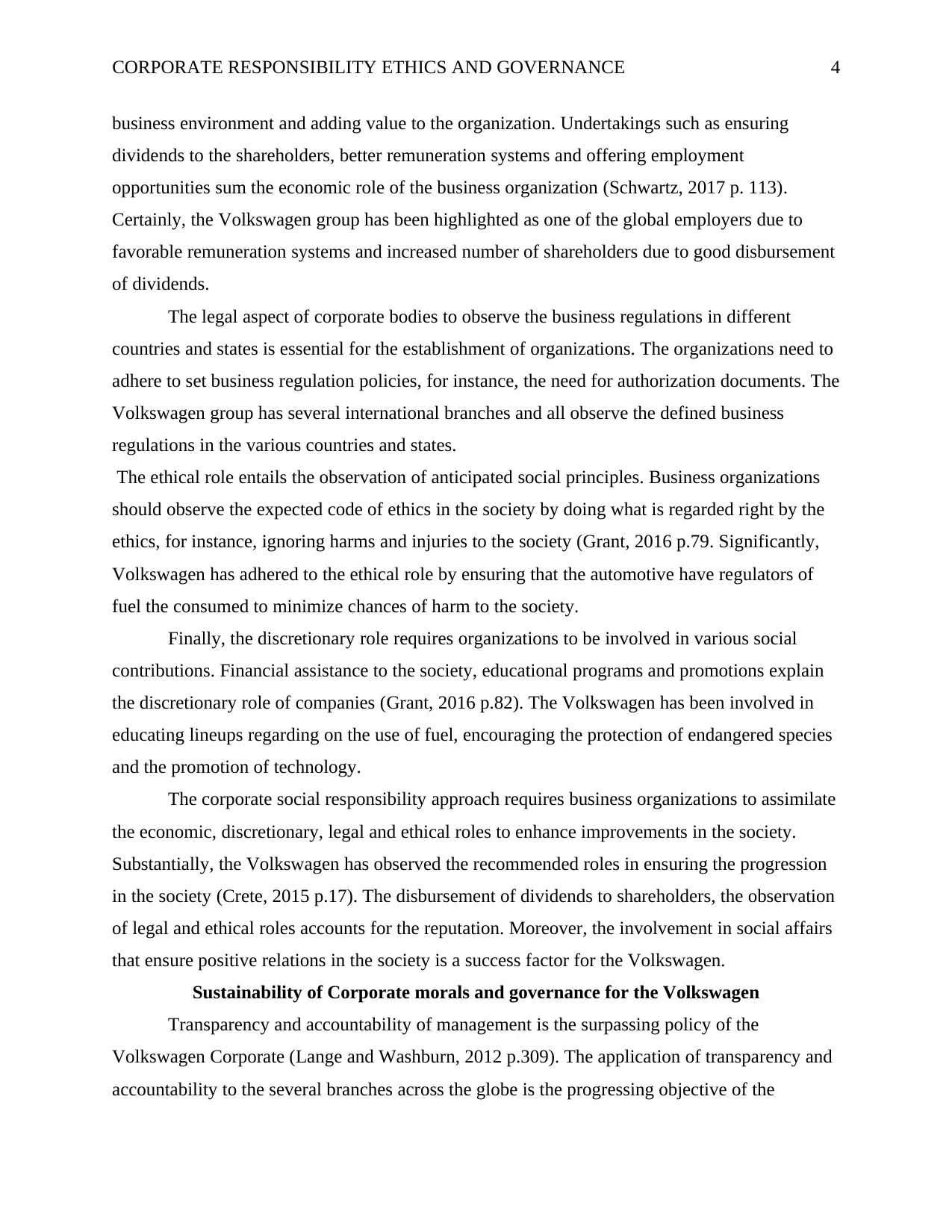
CORPORATE RESPONSIBILITY ETHICS AND GOVERNANCE 4
business environment and adding value to the organization. Undertakings such as ensuring
dividends to the shareholders, better remuneration systems and offering employment
opportunities sum the economic role of the business organization (Schwartz, 2017 p. 113).
Certainly, the Volkswagen group has been highlighted as one of the global employers due to
favorable remuneration systems and increased number of shareholders due to good disbursement
of dividends.
The legal aspect of corporate bodies to observe the business regulations in different
countries and states is essential for the establishment of organizations. The organizations need to
adhere to set business regulation policies, for instance, the need for authorization documents. The
Volkswagen group has several international branches and all observe the defined business
regulations in the various countries and states.
The ethical role entails the observation of anticipated social principles. Business organizations
should observe the expected code of ethics in the society by doing what is regarded right by the
ethics, for instance, ignoring harms and injuries to the society (Grant, 2016 p.79. Significantly,
Volkswagen has adhered to the ethical role by ensuring that the automotive have regulators of
fuel the consumed to minimize chances of harm to the society.
Finally, the discretionary role requires organizations to be involved in various social
contributions. Financial assistance to the society, educational programs and promotions explain
the discretionary role of companies (Grant, 2016 p.82). The Volkswagen has been involved in
educating lineups regarding on the use of fuel, encouraging the protection of endangered species
and the promotion of technology.
The corporate social responsibility approach requires business organizations to assimilate
the economic, discretionary, legal and ethical roles to enhance improvements in the society.
Substantially, the Volkswagen has observed the recommended roles in ensuring the progression
in the society (Crete, 2015 p.17). The disbursement of dividends to shareholders, the observation
of legal and ethical roles accounts for the reputation. Moreover, the involvement in social affairs
that ensure positive relations in the society is a success factor for the Volkswagen.
Sustainability of Corporate morals and governance for the Volkswagen
Transparency and accountability of management is the surpassing policy of the
Volkswagen Corporate (Lange and Washburn, 2012 p.309). The application of transparency and
accountability to the several branches across the globe is the progressing objective of the
business environment and adding value to the organization. Undertakings such as ensuring
dividends to the shareholders, better remuneration systems and offering employment
opportunities sum the economic role of the business organization (Schwartz, 2017 p. 113).
Certainly, the Volkswagen group has been highlighted as one of the global employers due to
favorable remuneration systems and increased number of shareholders due to good disbursement
of dividends.
The legal aspect of corporate bodies to observe the business regulations in different
countries and states is essential for the establishment of organizations. The organizations need to
adhere to set business regulation policies, for instance, the need for authorization documents. The
Volkswagen group has several international branches and all observe the defined business
regulations in the various countries and states.
The ethical role entails the observation of anticipated social principles. Business organizations
should observe the expected code of ethics in the society by doing what is regarded right by the
ethics, for instance, ignoring harms and injuries to the society (Grant, 2016 p.79. Significantly,
Volkswagen has adhered to the ethical role by ensuring that the automotive have regulators of
fuel the consumed to minimize chances of harm to the society.
Finally, the discretionary role requires organizations to be involved in various social
contributions. Financial assistance to the society, educational programs and promotions explain
the discretionary role of companies (Grant, 2016 p.82). The Volkswagen has been involved in
educating lineups regarding on the use of fuel, encouraging the protection of endangered species
and the promotion of technology.
The corporate social responsibility approach requires business organizations to assimilate
the economic, discretionary, legal and ethical roles to enhance improvements in the society.
Substantially, the Volkswagen has observed the recommended roles in ensuring the progression
in the society (Crete, 2015 p.17). The disbursement of dividends to shareholders, the observation
of legal and ethical roles accounts for the reputation. Moreover, the involvement in social affairs
that ensure positive relations in the society is a success factor for the Volkswagen.
Sustainability of Corporate morals and governance for the Volkswagen
Transparency and accountability of management is the surpassing policy of the
Volkswagen Corporate (Lange and Washburn, 2012 p.309). The application of transparency and
accountability to the several branches across the globe is the progressing objective of the
Paraphrase This Document
Need a fresh take? Get an instant paraphrase of this document with our AI Paraphraser
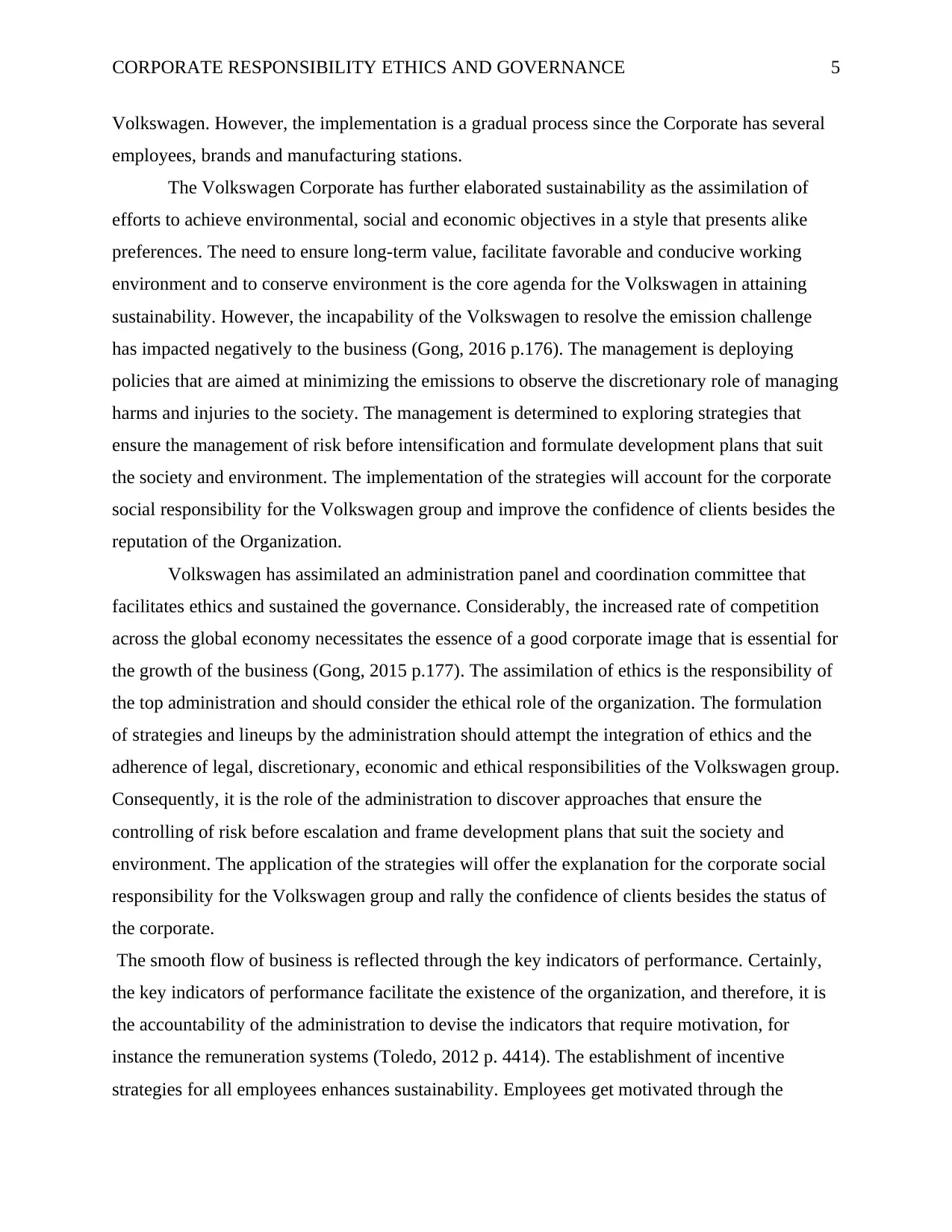
CORPORATE RESPONSIBILITY ETHICS AND GOVERNANCE 5
Volkswagen. However, the implementation is a gradual process since the Corporate has several
employees, brands and manufacturing stations.
The Volkswagen Corporate has further elaborated sustainability as the assimilation of
efforts to achieve environmental, social and economic objectives in a style that presents alike
preferences. The need to ensure long-term value, facilitate favorable and conducive working
environment and to conserve environment is the core agenda for the Volkswagen in attaining
sustainability. However, the incapability of the Volkswagen to resolve the emission challenge
has impacted negatively to the business (Gong, 2016 p.176). The management is deploying
policies that are aimed at minimizing the emissions to observe the discretionary role of managing
harms and injuries to the society. The management is determined to exploring strategies that
ensure the management of risk before intensification and formulate development plans that suit
the society and environment. The implementation of the strategies will account for the corporate
social responsibility for the Volkswagen group and improve the confidence of clients besides the
reputation of the Organization.
Volkswagen has assimilated an administration panel and coordination committee that
facilitates ethics and sustained the governance. Considerably, the increased rate of competition
across the global economy necessitates the essence of a good corporate image that is essential for
the growth of the business (Gong, 2015 p.177). The assimilation of ethics is the responsibility of
the top administration and should consider the ethical role of the organization. The formulation
of strategies and lineups by the administration should attempt the integration of ethics and the
adherence of legal, discretionary, economic and ethical responsibilities of the Volkswagen group.
Consequently, it is the role of the administration to discover approaches that ensure the
controlling of risk before escalation and frame development plans that suit the society and
environment. The application of the strategies will offer the explanation for the corporate social
responsibility for the Volkswagen group and rally the confidence of clients besides the status of
the corporate.
The smooth flow of business is reflected through the key indicators of performance. Certainly,
the key indicators of performance facilitate the existence of the organization, and therefore, it is
the accountability of the administration to devise the indicators that require motivation, for
instance the remuneration systems (Toledo, 2012 p. 4414). The establishment of incentive
strategies for all employees enhances sustainability. Employees get motivated through the
Volkswagen. However, the implementation is a gradual process since the Corporate has several
employees, brands and manufacturing stations.
The Volkswagen Corporate has further elaborated sustainability as the assimilation of
efforts to achieve environmental, social and economic objectives in a style that presents alike
preferences. The need to ensure long-term value, facilitate favorable and conducive working
environment and to conserve environment is the core agenda for the Volkswagen in attaining
sustainability. However, the incapability of the Volkswagen to resolve the emission challenge
has impacted negatively to the business (Gong, 2016 p.176). The management is deploying
policies that are aimed at minimizing the emissions to observe the discretionary role of managing
harms and injuries to the society. The management is determined to exploring strategies that
ensure the management of risk before intensification and formulate development plans that suit
the society and environment. The implementation of the strategies will account for the corporate
social responsibility for the Volkswagen group and improve the confidence of clients besides the
reputation of the Organization.
Volkswagen has assimilated an administration panel and coordination committee that
facilitates ethics and sustained the governance. Considerably, the increased rate of competition
across the global economy necessitates the essence of a good corporate image that is essential for
the growth of the business (Gong, 2015 p.177). The assimilation of ethics is the responsibility of
the top administration and should consider the ethical role of the organization. The formulation
of strategies and lineups by the administration should attempt the integration of ethics and the
adherence of legal, discretionary, economic and ethical responsibilities of the Volkswagen group.
Consequently, it is the role of the administration to discover approaches that ensure the
controlling of risk before escalation and frame development plans that suit the society and
environment. The application of the strategies will offer the explanation for the corporate social
responsibility for the Volkswagen group and rally the confidence of clients besides the status of
the corporate.
The smooth flow of business is reflected through the key indicators of performance. Certainly,
the key indicators of performance facilitate the existence of the organization, and therefore, it is
the accountability of the administration to devise the indicators that require motivation, for
instance the remuneration systems (Toledo, 2012 p. 4414). The establishment of incentive
strategies for all employees enhances sustainability. Employees get motivated through the
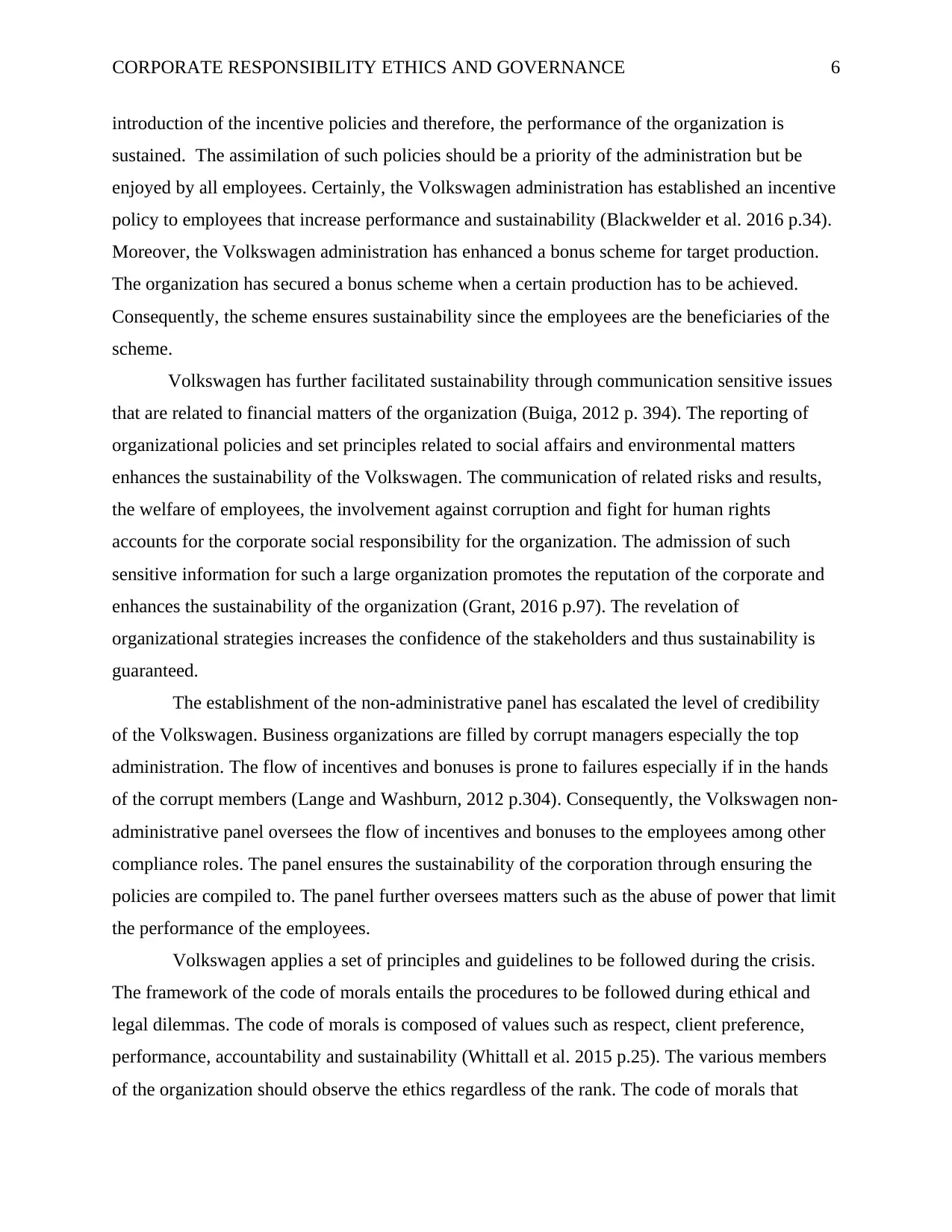
CORPORATE RESPONSIBILITY ETHICS AND GOVERNANCE 6
introduction of the incentive policies and therefore, the performance of the organization is
sustained. The assimilation of such policies should be a priority of the administration but be
enjoyed by all employees. Certainly, the Volkswagen administration has established an incentive
policy to employees that increase performance and sustainability (Blackwelder et al. 2016 p.34).
Moreover, the Volkswagen administration has enhanced a bonus scheme for target production.
The organization has secured a bonus scheme when a certain production has to be achieved.
Consequently, the scheme ensures sustainability since the employees are the beneficiaries of the
scheme.
Volkswagen has further facilitated sustainability through communication sensitive issues
that are related to financial matters of the organization (Buiga, 2012 p. 394). The reporting of
organizational policies and set principles related to social affairs and environmental matters
enhances the sustainability of the Volkswagen. The communication of related risks and results,
the welfare of employees, the involvement against corruption and fight for human rights
accounts for the corporate social responsibility for the organization. The admission of such
sensitive information for such a large organization promotes the reputation of the corporate and
enhances the sustainability of the organization (Grant, 2016 p.97). The revelation of
organizational strategies increases the confidence of the stakeholders and thus sustainability is
guaranteed.
The establishment of the non-administrative panel has escalated the level of credibility
of the Volkswagen. Business organizations are filled by corrupt managers especially the top
administration. The flow of incentives and bonuses is prone to failures especially if in the hands
of the corrupt members (Lange and Washburn, 2012 p.304). Consequently, the Volkswagen non-
administrative panel oversees the flow of incentives and bonuses to the employees among other
compliance roles. The panel ensures the sustainability of the corporation through ensuring the
policies are compiled to. The panel further oversees matters such as the abuse of power that limit
the performance of the employees.
Volkswagen applies a set of principles and guidelines to be followed during the crisis.
The framework of the code of morals entails the procedures to be followed during ethical and
legal dilemmas. The code of morals is composed of values such as respect, client preference,
performance, accountability and sustainability (Whittall et al. 2015 p.25). The various members
of the organization should observe the ethics regardless of the rank. The code of morals that
introduction of the incentive policies and therefore, the performance of the organization is
sustained. The assimilation of such policies should be a priority of the administration but be
enjoyed by all employees. Certainly, the Volkswagen administration has established an incentive
policy to employees that increase performance and sustainability (Blackwelder et al. 2016 p.34).
Moreover, the Volkswagen administration has enhanced a bonus scheme for target production.
The organization has secured a bonus scheme when a certain production has to be achieved.
Consequently, the scheme ensures sustainability since the employees are the beneficiaries of the
scheme.
Volkswagen has further facilitated sustainability through communication sensitive issues
that are related to financial matters of the organization (Buiga, 2012 p. 394). The reporting of
organizational policies and set principles related to social affairs and environmental matters
enhances the sustainability of the Volkswagen. The communication of related risks and results,
the welfare of employees, the involvement against corruption and fight for human rights
accounts for the corporate social responsibility for the organization. The admission of such
sensitive information for such a large organization promotes the reputation of the corporate and
enhances the sustainability of the organization (Grant, 2016 p.97). The revelation of
organizational strategies increases the confidence of the stakeholders and thus sustainability is
guaranteed.
The establishment of the non-administrative panel has escalated the level of credibility
of the Volkswagen. Business organizations are filled by corrupt managers especially the top
administration. The flow of incentives and bonuses is prone to failures especially if in the hands
of the corrupt members (Lange and Washburn, 2012 p.304). Consequently, the Volkswagen non-
administrative panel oversees the flow of incentives and bonuses to the employees among other
compliance roles. The panel ensures the sustainability of the corporation through ensuring the
policies are compiled to. The panel further oversees matters such as the abuse of power that limit
the performance of the employees.
Volkswagen applies a set of principles and guidelines to be followed during the crisis.
The framework of the code of morals entails the procedures to be followed during ethical and
legal dilemmas. The code of morals is composed of values such as respect, client preference,
performance, accountability and sustainability (Whittall et al. 2015 p.25). The various members
of the organization should observe the ethics regardless of the rank. The code of morals that
⊘ This is a preview!⊘
Do you want full access?
Subscribe today to unlock all pages.

Trusted by 1+ million students worldwide
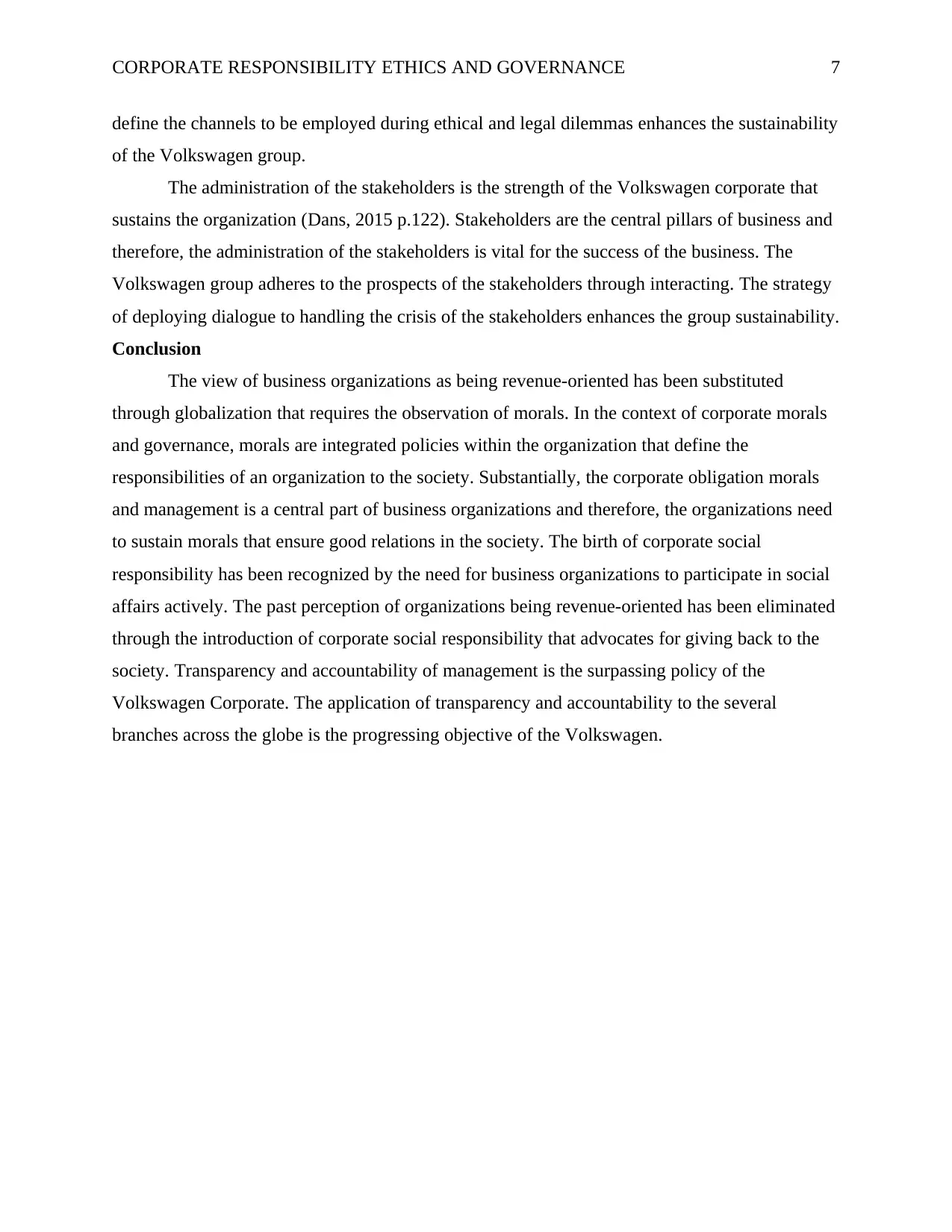
CORPORATE RESPONSIBILITY ETHICS AND GOVERNANCE 7
define the channels to be employed during ethical and legal dilemmas enhances the sustainability
of the Volkswagen group.
The administration of the stakeholders is the strength of the Volkswagen corporate that
sustains the organization (Dans, 2015 p.122). Stakeholders are the central pillars of business and
therefore, the administration of the stakeholders is vital for the success of the business. The
Volkswagen group adheres to the prospects of the stakeholders through interacting. The strategy
of deploying dialogue to handling the crisis of the stakeholders enhances the group sustainability.
Conclusion
The view of business organizations as being revenue-oriented has been substituted
through globalization that requires the observation of morals. In the context of corporate morals
and governance, morals are integrated policies within the organization that define the
responsibilities of an organization to the society. Substantially, the corporate obligation morals
and management is a central part of business organizations and therefore, the organizations need
to sustain morals that ensure good relations in the society. The birth of corporate social
responsibility has been recognized by the need for business organizations to participate in social
affairs actively. The past perception of organizations being revenue-oriented has been eliminated
through the introduction of corporate social responsibility that advocates for giving back to the
society. Transparency and accountability of management is the surpassing policy of the
Volkswagen Corporate. The application of transparency and accountability to the several
branches across the globe is the progressing objective of the Volkswagen.
define the channels to be employed during ethical and legal dilemmas enhances the sustainability
of the Volkswagen group.
The administration of the stakeholders is the strength of the Volkswagen corporate that
sustains the organization (Dans, 2015 p.122). Stakeholders are the central pillars of business and
therefore, the administration of the stakeholders is vital for the success of the business. The
Volkswagen group adheres to the prospects of the stakeholders through interacting. The strategy
of deploying dialogue to handling the crisis of the stakeholders enhances the group sustainability.
Conclusion
The view of business organizations as being revenue-oriented has been substituted
through globalization that requires the observation of morals. In the context of corporate morals
and governance, morals are integrated policies within the organization that define the
responsibilities of an organization to the society. Substantially, the corporate obligation morals
and management is a central part of business organizations and therefore, the organizations need
to sustain morals that ensure good relations in the society. The birth of corporate social
responsibility has been recognized by the need for business organizations to participate in social
affairs actively. The past perception of organizations being revenue-oriented has been eliminated
through the introduction of corporate social responsibility that advocates for giving back to the
society. Transparency and accountability of management is the surpassing policy of the
Volkswagen Corporate. The application of transparency and accountability to the several
branches across the globe is the progressing objective of the Volkswagen.
Paraphrase This Document
Need a fresh take? Get an instant paraphrase of this document with our AI Paraphraser
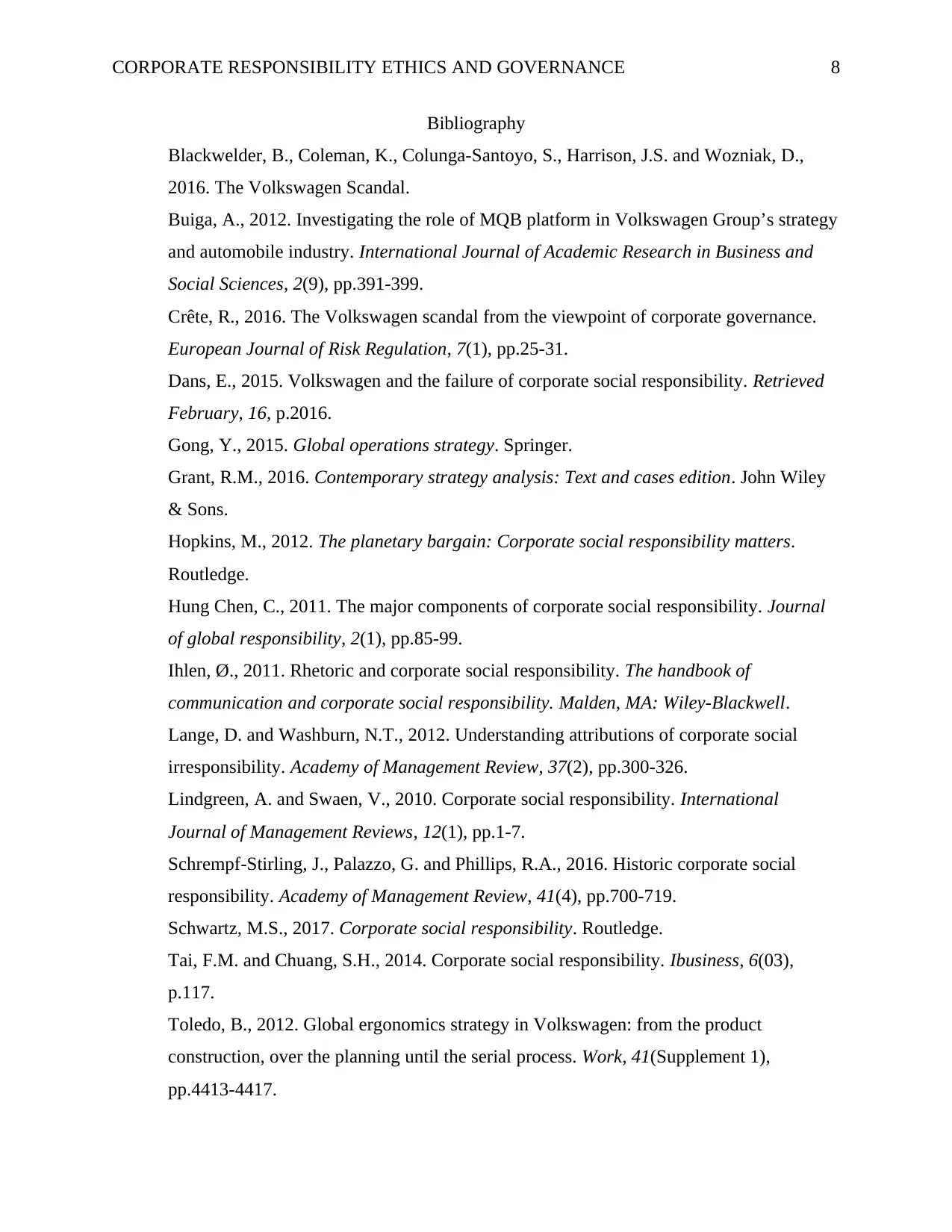
CORPORATE RESPONSIBILITY ETHICS AND GOVERNANCE 8
Bibliography
Blackwelder, B., Coleman, K., Colunga-Santoyo, S., Harrison, J.S. and Wozniak, D.,
2016. The Volkswagen Scandal.
Buiga, A., 2012. Investigating the role of MQB platform in Volkswagen Group’s strategy
and automobile industry. International Journal of Academic Research in Business and
Social Sciences, 2(9), pp.391-399.
Crête, R., 2016. The Volkswagen scandal from the viewpoint of corporate governance.
European Journal of Risk Regulation, 7(1), pp.25-31.
Dans, E., 2015. Volkswagen and the failure of corporate social responsibility. Retrieved
February, 16, p.2016.
Gong, Y., 2015. Global operations strategy. Springer.
Grant, R.M., 2016. Contemporary strategy analysis: Text and cases edition. John Wiley
& Sons.
Hopkins, M., 2012. The planetary bargain: Corporate social responsibility matters.
Routledge.
Hung Chen, C., 2011. The major components of corporate social responsibility. Journal
of global responsibility, 2(1), pp.85-99.
Ihlen, Ø., 2011. Rhetoric and corporate social responsibility. The handbook of
communication and corporate social responsibility. Malden, MA: Wiley-Blackwell.
Lange, D. and Washburn, N.T., 2012. Understanding attributions of corporate social
irresponsibility. Academy of Management Review, 37(2), pp.300-326.
Lindgreen, A. and Swaen, V., 2010. Corporate social responsibility. International
Journal of Management Reviews, 12(1), pp.1-7.
Schrempf-Stirling, J., Palazzo, G. and Phillips, R.A., 2016. Historic corporate social
responsibility. Academy of Management Review, 41(4), pp.700-719.
Schwartz, M.S., 2017. Corporate social responsibility. Routledge.
Tai, F.M. and Chuang, S.H., 2014. Corporate social responsibility. Ibusiness, 6(03),
p.117.
Toledo, B., 2012. Global ergonomics strategy in Volkswagen: from the product
construction, over the planning until the serial process. Work, 41(Supplement 1),
pp.4413-4417.
Bibliography
Blackwelder, B., Coleman, K., Colunga-Santoyo, S., Harrison, J.S. and Wozniak, D.,
2016. The Volkswagen Scandal.
Buiga, A., 2012. Investigating the role of MQB platform in Volkswagen Group’s strategy
and automobile industry. International Journal of Academic Research in Business and
Social Sciences, 2(9), pp.391-399.
Crête, R., 2016. The Volkswagen scandal from the viewpoint of corporate governance.
European Journal of Risk Regulation, 7(1), pp.25-31.
Dans, E., 2015. Volkswagen and the failure of corporate social responsibility. Retrieved
February, 16, p.2016.
Gong, Y., 2015. Global operations strategy. Springer.
Grant, R.M., 2016. Contemporary strategy analysis: Text and cases edition. John Wiley
& Sons.
Hopkins, M., 2012. The planetary bargain: Corporate social responsibility matters.
Routledge.
Hung Chen, C., 2011. The major components of corporate social responsibility. Journal
of global responsibility, 2(1), pp.85-99.
Ihlen, Ø., 2011. Rhetoric and corporate social responsibility. The handbook of
communication and corporate social responsibility. Malden, MA: Wiley-Blackwell.
Lange, D. and Washburn, N.T., 2012. Understanding attributions of corporate social
irresponsibility. Academy of Management Review, 37(2), pp.300-326.
Lindgreen, A. and Swaen, V., 2010. Corporate social responsibility. International
Journal of Management Reviews, 12(1), pp.1-7.
Schrempf-Stirling, J., Palazzo, G. and Phillips, R.A., 2016. Historic corporate social
responsibility. Academy of Management Review, 41(4), pp.700-719.
Schwartz, M.S., 2017. Corporate social responsibility. Routledge.
Tai, F.M. and Chuang, S.H., 2014. Corporate social responsibility. Ibusiness, 6(03),
p.117.
Toledo, B., 2012. Global ergonomics strategy in Volkswagen: from the product
construction, over the planning until the serial process. Work, 41(Supplement 1),
pp.4413-4417.
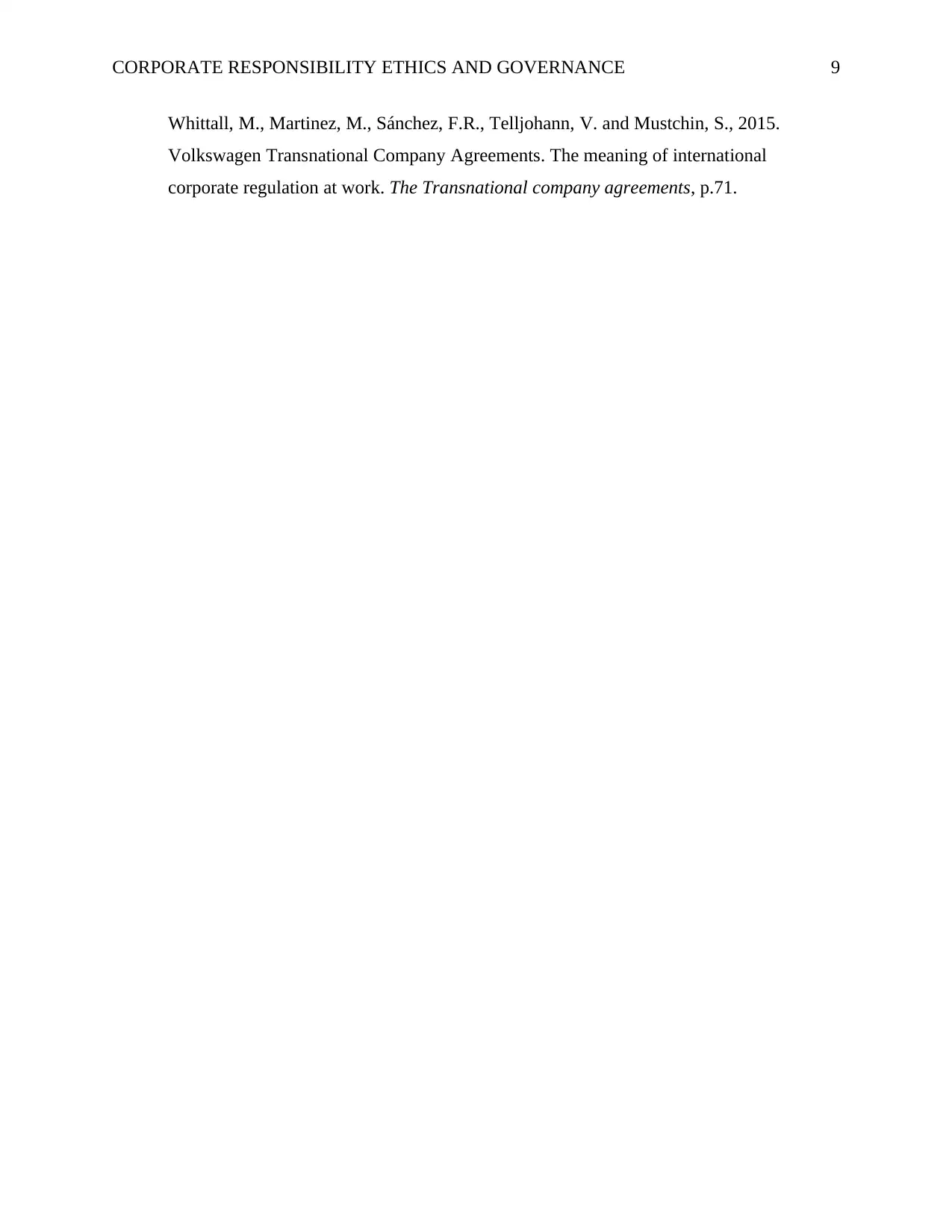
CORPORATE RESPONSIBILITY ETHICS AND GOVERNANCE 9
Whittall, M., Martinez, M., Sánchez, F.R., Telljohann, V. and Mustchin, S., 2015.
Volkswagen Transnational Company Agreements. The meaning of international
corporate regulation at work. The Transnational company agreements, p.71.
Whittall, M., Martinez, M., Sánchez, F.R., Telljohann, V. and Mustchin, S., 2015.
Volkswagen Transnational Company Agreements. The meaning of international
corporate regulation at work. The Transnational company agreements, p.71.
⊘ This is a preview!⊘
Do you want full access?
Subscribe today to unlock all pages.

Trusted by 1+ million students worldwide
1 out of 9
Related Documents
Your All-in-One AI-Powered Toolkit for Academic Success.
+13062052269
info@desklib.com
Available 24*7 on WhatsApp / Email
![[object Object]](/_next/static/media/star-bottom.7253800d.svg)
Unlock your academic potential
Copyright © 2020–2026 A2Z Services. All Rights Reserved. Developed and managed by ZUCOL.





